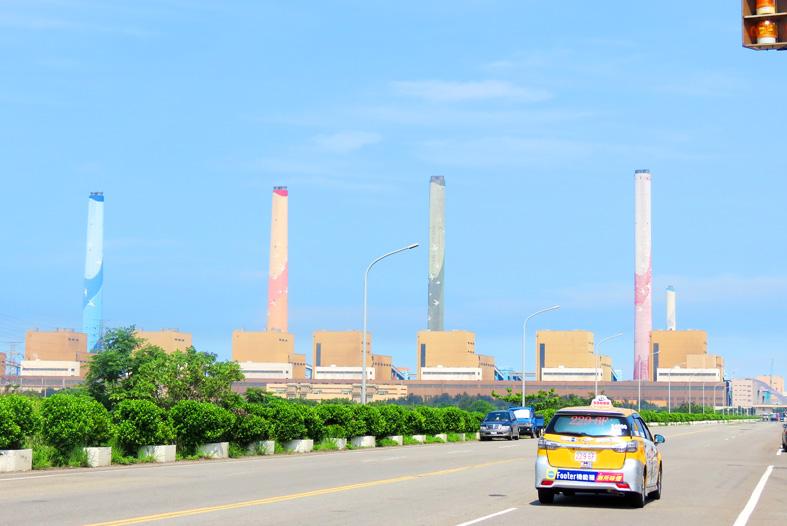A spike in demand for electricity made it necessary to restart the third coal-fired generator at the Taichung Power Plant, Taiwan Power Co (Taipower, 台電) said yesterday as a feud with the Taichung City Government lingers.
Taichung Mayor Lu Shiow-yen (盧秀燕) has sought to keep the generator from being used. In 2019, he revoked Taipower’s license to operate the generator.
However, the state-run utility has taken the city government to court over the license revocation and won the case in February last year, Taipower manager Chang Ting-shu (張廷抒) said.

Photo: Su Ching-feng, Taipei Times
“We would like to remind the Taichung City Government that operation of the third coal-fired generator is completely legal,” Chang said, adding that the municipality is being “unreasonable and obstructive.”
The plant has long been a sore spot for residents, who complain about pollution.
Taipower said an unexpected high rate of electricity use while plants elsewhere were undergoing maintenance made it inevitable that the generator would be brought back online.
“From January to last month, we used 3.3 percent more electricity than the same period last year,” Chang said. “Returning Taiwanese manufacturers, high demand for exports and increased domestic electricity use are all up.”
“We were taken by surprise,” he said.
The generator has been retrofitted to reduce pollution, Chang said.
“It used to emit 0.6g to 0.7g of particulate pollution per kilowatt-hour, but that has been reduced to 0.46g,” he said.
Taichung’s air quality problems would subside when liquefied natural gas (LNG) plants — due to come online this summer — start generating electricity, he said, adding that Taiwan would not face an electricity shortage this summer.
However, Taiwan’s water situation is exacerbating an electricity crisis, said Chen Jong-shun (陳中舜), an assistant research fellow at the Chung-Hua Institution for Economic Research (中華經濟研究院).
“Taiwan is highly reliant on hydroelectricity to adjust peak energy usage, and the serious water shortage has directly affected our ability to use hydroelectricity,” Chen said.
The problem would worsen, as energy use spikes in summer, with July and August bringing the greatest demand, he said.
Moreover, the Guosheng Nuclear Power Plant in New Taipei City’s Wanli District (萬里) in June is to reduce electricity generation.
The central government should keep the Guosheng and Ma-anshan Nuclear Power Plant in Pingtung County’s Ma-anshan (馬鞍山) running beyond their planned lifespans to save Taiwan from further power crunches, Chen said.
“It is absolutely doable on a technical level, as long as Taipei has the political resolve,” he added.

Taiwan Transport and Storage Corp (TTS, 台灣通運倉儲) yesterday unveiled its first electric tractor unit — manufactured by Volvo Trucks — in a ceremony in Taipei, and said the unit would soon be used to transport cement produced by Taiwan Cement Corp (TCC, 台灣水泥). Both TTS and TCC belong to TCC International Holdings Ltd (台泥國際集團). With the electric tractor unit, the Taipei-based cement firm would become the first in Taiwan to use electric vehicles to transport construction materials. TTS chairman Koo Kung-yi (辜公怡), Volvo Trucks vice president of sales and marketing Johan Selven, TCC president Roman Cheng (程耀輝) and Taikoo Motors Group

Among the rows of vibrators, rubber torsos and leather harnesses at a Chinese sex toys exhibition in Shanghai this weekend, the beginnings of an artificial intelligence (AI)-driven shift in the industry quietly pulsed. China manufactures about 70 percent of the world’s sex toys, most of it the “hardware” on display at the fair — whether that be technicolor tentacled dildos or hyper-realistic personalized silicone dolls. Yet smart toys have been rising in popularity for some time. Many major European and US brands already offer tech-enhanced products that can enable long-distance love, monitor well-being and even bring people one step closer to

RECORD-BREAKING: TSMC’s net profit last quarter beat market expectations by expanding 8.9% and it was the best first-quarter profit in the chipmaker’s history Taiwan Semiconductor Manufacturing Co (TSMC, 台積電), which counts Nvidia Corp as a key customer, yesterday said that artificial intelligence (AI) server chip revenue is set to more than double this year from last year amid rising demand. The chipmaker expects the growth momentum to continue in the next five years with an annual compound growth rate of 50 percent, TSMC chief executive officer C.C. Wei (魏哲家) told investors yesterday. By 2028, AI chips’ contribution to revenue would climb to about 20 percent from a percentage in the low teens, Wei said. “Almost all the AI innovators are working with TSMC to address the

Malaysia’s leader yesterday announced plans to build a massive semiconductor design park, aiming to boost the Southeast Asian nation’s role in the global chip industry. A prominent player in the semiconductor industry for decades, Malaysia accounts for an estimated 13 percent of global back-end manufacturing, according to German tech giant Bosch. Now it wants to go beyond production and emerge as a chip design powerhouse too, Malaysian Prime Minister Anwar Ibrahim said. “I am pleased to announce the largest IC (integrated circuit) Design Park in Southeast Asia, that will house world-class anchor tenants and collaborate with global companies such as Arm [Holdings PLC],”